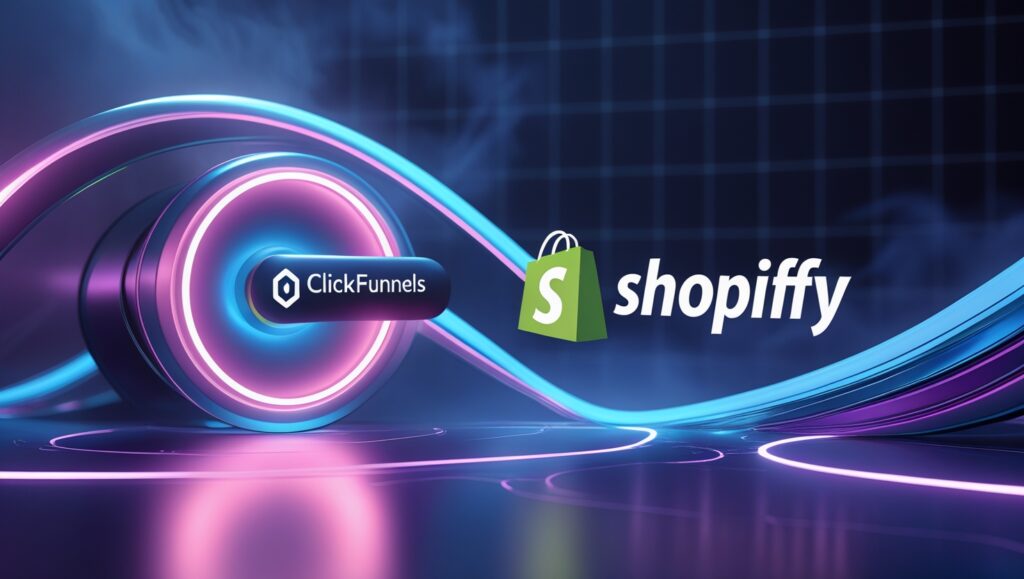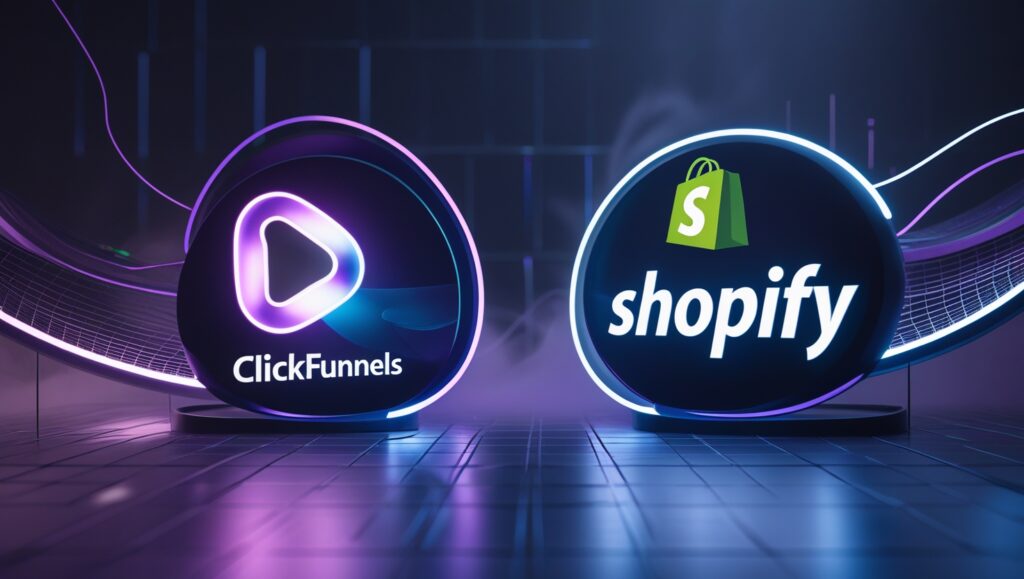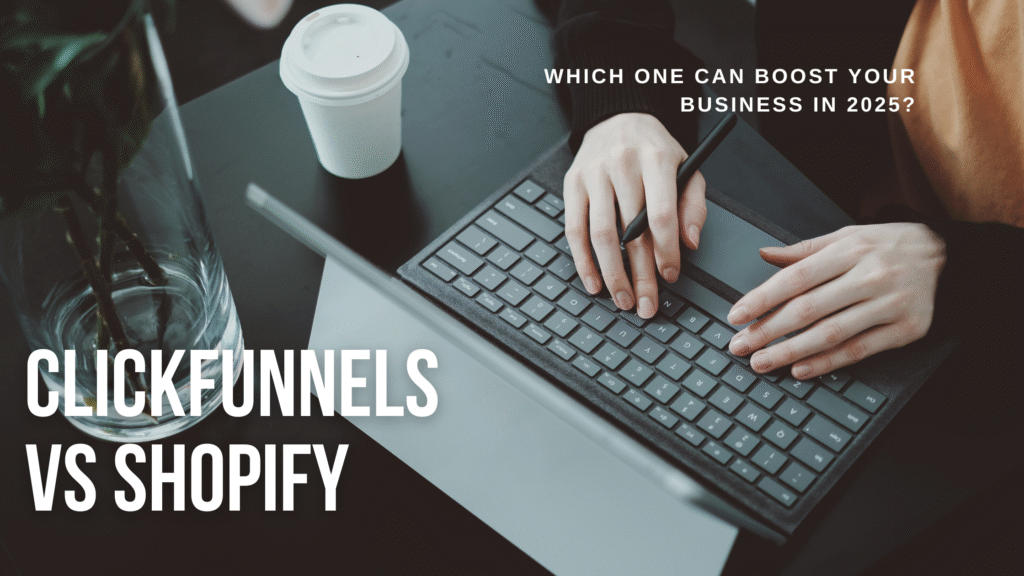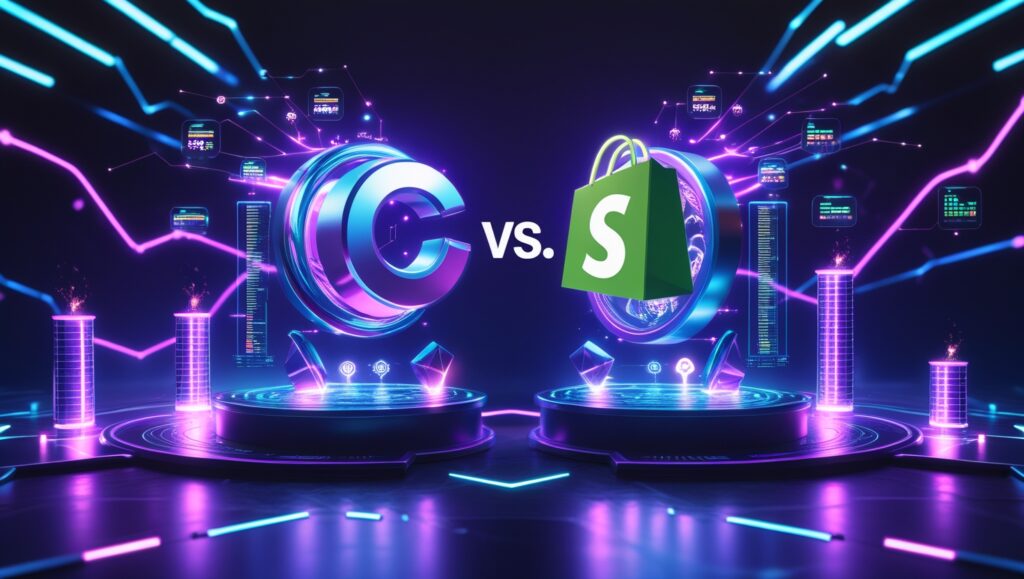I. Introduction to Clickfunnels vs Shopify
A. Overview of Clickfunnels
- Purpose and core functionalities Clickfunnels is mainly designed to help create effective sales funnels. With built-in templates and a step-by-step process, users can craft landing pages, opt-in forms, and upsell systems that guide potential customers from browsing to buying seamlessly.
- Target audience and usage context This platform appeals to marketers, online course creators, and anyone focused on selling services or products through effective funnel strategies. It’s ideal for those who rely heavily on digital marketing tactics.
- Key statistics and user trends Clickfunnels has a growing user base, with over 100,000 active users. The platform has reported billions in sales generated through the funnels created by its users, showcasing its robust potential in the e-commerce landscape.
B. Overview of Shopify
- Purpose and core functionalities Shopify is a comprehensive e-commerce platform that enables businesses to set up and manage online stores. It provides tools for product management, payment processing, and inventory tracking, making it convenient for selling products directly to consumers.
- Target audience and usage context Shopify targets small to medium-sized businesses, entrepreneurs, and larger enterprises looking to sell goods online. It’s perfect for any business aiming to create a polished online presence without needing extensive technical skills.
- Key statistics and user trends Shopify serves over 1.7 million businesses worldwide, generating more than $200 billion in sales. This indicates a strong and diverse community of users who trust the platform for their retail needs.

C. The Importance of Choosing the Right Platform Clickfunnels vs Shopify
- Impact on sales performanceThe right platform significantly affects how effectively you can market and sell your products. A suitable choice can streamline operations and boost conversion rates.
- Long-term business growth considerationsAs your business grows, your chosen platform should have the capability to scale alongside your operations, providing advanced tools and features when needed.
- Alignment with business goalsWhether aiming for rapid sales through funnels or establishing a robust online storefront, using a platform aligned with your strategies is crucial for overall success.
II. Feature Comparison Clickfunnels vs Shopify
A. E-commerce Capabilities Clickfunnels vs Shopify
- Product management and inventory tracking in ShopifyShopify excels in product management, allowing for easy inventory tracking, collection organization, and customer options, which simplify the entire sales process.
- Sales funnel creation in ClickfunnelsClickfunnels shines in guiding potential customers through the buying journey, from awareness to purchase, with beautifully designed sales funnels tailored to specific goals.
- Payment processing options and feesShopify offers multiple payment gateways with competitive fees, while Clickfunnels supports PayPal and Stripe but may require additional fees for third-party integrations.
B. User Interface and Experience Clickfunnels vs Shopify
- Ease of navigation and design templates in ShopifyShopify’s user-friendly interface streamlines setup, and it boasts numerous design templates that make customization straightforward, even for beginners.
- Funnel building process in ClickfunnelsClickfunnels offers an intuitive drag-and-drop builder, enabling users to create funnels without technical skills, though the learning curve can be steep for some.
- Customization flexibility and tools availableBoth platforms offer customization, but Shopify stands out with extensive themes and plugins, while Clickfunnels focuses on funnel-specific tools.
C. Marketing Tools and Integrations Clickfunnels vs Shopify
- Built-in marketing features of ShopifyShopify provides email marketing, SEO optimization tools, and social media integration, making marketing efforts cohesive from within the platform.
- Email marketing and automation in ClickfunnelsClickfunnels includes powerful email marketing and automation features, allowing users to follow up with leads effectively through tailored communications.
- Third-party integrations and add-ons for both platformsShopify supports a vast marketplace of apps and integrations, while Clickfunnels offers add-ons designed to enhance funnel performance and marketing efforts.
If you’re already considering Shopify, you might also want to explore
Shopify Capital – rates, reviews & how to apply to boost your business financing options.

III. Pricing and Plans Clickfunnels vs Shopify
A. Shopify Pricing Structure
- Basic, Shopify, and Advanced plansShopify provides tiered plans; Basic at $29/month, Shopify at $79/month, and Advanced at $299/month, catering to varying business sizes and needs.
- Transaction fees and additional costsShopify charges transaction fees unless using Shopify Payments. These fees can add up; however, the quality of features enhances the overall value.
- Value for businesses of different sizesEach plan is crafted to provide value based on scope and needs, allowing businesses of all sizes to find a suitable starting point.
B. Clickfunnels Pricing Structure
- Basic and Etison plansClickfunnels offers two primary plans: Basic at $147/month and Etison at $297/month, with additional features at higher tiers, particularly for larger enterprises.
- Costs associated with upgrades and featuresAs businesses grow, additional customization options often incur extra costs, making it crucial to evaluate long-term implications.
- Value for businesses of different sales strategiesClickfunnels is especially beneficial for businesses focused on funnel-based sales strategies, often resulting in higher revenue despite a potentially higher upfront cost.
C. Cost-Benefit Analysis Clickfunnels vs Shopify
- Comparing total cost of ownership for both platformsShopify might have lower maintenance costs due to its scalable pricing, while Clickfunnels’ investment pays off for sales-driven enterprises.
- Return on investment expectationsEvaluating ROI can be subjective, as various factors like sales volume, customer acquisition cost, and platform effectiveness play roles in determining value.
- Long-term financial implicationsBoth platforms have distinct long-term cost structures; understanding business scalability can help determine the best-fit solution for future growth.
IV. Customer Support and Resources
A. Customer Support Options Clickfunnels vs Shopify
- Availability of live support and resources in ShopifyShopify offers 24/7 customer support through email, live chat, and phone, providing timely assistance for users.
- Clickfunnels support channels and responsivenessClickfunnels also has several support options, including live chat and a resource center, although users sometimes note varied response times.
- Comparison of user experience with supportGenerally, Shopify users report a smoother support experience, but both platforms have their strengths based on personal experiences.
- Shopify offers its own funding program called Shopify Capital — learn how it works and whether you’re eligible.
B. Learning Resources and Community Clickfunnels vs Shopify
- Educational resources available for Shopify usersShopify provides an extensive library of tutorials, user guides, and a lively community forum, making it easier for users to find help and resources.
- Clickfunnels training and community engagementClickfunnels boasts an active community and training programs, helping users learn effectively, especially when it comes to maximizing funnel performance.
- User forums, FAQs, and knowledge bases analysisBoth platforms maintain rich knowledge bases with FAQs and forums, creating supportive environments for users to connect and learn from each other.

C. Impact on User Experience Clickfunnels vs shopify
- How support and resources affect salesResponsive support can significantly impact user experience and sales, as quick resolutions can keep businesses running smoothly.
- The role of community in troubleshootingBoth platforms benefit from engaged communities, where users share tips and solutions that enhance the overall ecosystem and user experience.
- The importance of continuous learningStaying updated with platform features and best practices is vital for success. Resources from each platform help foster this growth.
V. Case Studies and User Experiences Clickfunnels vs Shopify
A. Success Stories with Shopify
- E-commerce brands that grew using ShopifyMany well-known brands, like Gymshark and Allbirds, have utilized Shopify to scale their operations and enhance customer experiences successfully.
- Analysis of user testimonials and reviewsUsers often cite the ease of setup and variety of integrations as reasons for their satisfaction, making Shopify a preferred choice for many.
- Lessons learned from successful Shopify businessesFocusing on branding, product quality, and customer service stand out as key areas that successful Shopify businesses emphasize.
B. Success Stories with Clickfunnels
- Businesses that excelled with sales funnelsHigh-ticket coaches and service providers frequently credit Clickfunnels for their sales success, emphasizing streamlined user journeys.
- Analysis of user testimonials and reviewsMany Clickfunnels users appreciate the potential for structured sales processes, leading to increased conversions despite initial complexities.
- Lessons learned from successful Clickfunnels usersEffective marketing strategies combined with deep customer insights often prove crucial for harnessing the platform’s true potential.
C. Comparative Analysis of Success Rates
- Metrics used to measure success across platformsKey performance indicators like conversion rates, customer acquisition costs, and average order value play critical roles in evaluating success.
- Factors influencing sales growthA combination of marketing strategies, customer experience, and platform optimization are often essential in driving sales growth effectively.
- Key takeaways from both success storiesBoth platforms showcase how adaptability and understanding your audience lead to notable growth, regardless of the chosen solution.
VI. Conclusion: Making the Right Choice for Your Business
A. Summary of Key Findings Clickfunnels vs Shopify
- Recap of platform strengths and weaknessesShopify excels in product management and ease of use, while Clickfunnels is powerful for creating sales-driven funnels. Each has unique benefits based on business needs.
- Importance of aligning features with business goalsThe right platform should support your sales strategy and help you achieve your goals without complicating operations.
- Consideration of budget and support needsUnderstanding your budget and support requirements will significantly influence which platform can best serve your business.

B. Final Thoughts on Clickfunnels vs Shopify
- When to choose one platform over the otherChoose Shopify if you need a straightforward online store option; select Clickfunnels for sales-driven strategies with a focus on funnel creation.
- The evolving landscape of e-commerce solutionsAs customer needs and technologies evolve, being adaptable and considering emerging trends will be crucial for staying relevant.
- Future trends and innovations to watchAutomation, AI-driven e-commerce experiences, and enhanced personalization are just some trends that will shape the future of online retail.
C. Recommendations for Different Business Types
- Small businesses vs. large enterprisesSmall businesses may find Shopify more accessible, while larger enterprises can benefit from the sophisticated funnel capabilities of Clickfunnels.
- Product-based businesses vs. service-oriented businessesProduct-focused shops lean towards Shopify, while service-oriented businesses may excel with Clickfunnels’ funnel features.
- Startups vs. established brandsStartups might appreciate the scalability of Shopify, while established brands with existing sales funnels can leverage Clickfunnels’ capabilities.
VII. FAQs Clickfunnels vs Shopify
A. What is the primary difference between Clickfunnels vs Shopify?
Clickfunnels is focused on creating sales funnels to guide customers through the buying process,
while Shopify is a full-fledged e-commerce platform for managing online stores.
B. Can I integrate other tools with these platforms?
Yes, both platforms allow integrations, although the range and ease can vary.
Shopify has a broader app ecosystem, while Clickfunnels focuses on funnel-related tools.
C. Which platform is better for beginner entrepreneurs?
Shopify is generally more beginner-friendly due to its straightforward setup and user-oriented design, making it easier to get started with e-commerce.
Also Shopify offers its own funding program called Shopify Capital — learn how it works and whether you’re eligible.
D. How do I choose the right plan for my business?
Evaluate your business size, sales goals, and required features.
Consider starting with the basic plan and upgrading as your needs grow.
E. Is it possible to switch from one platform to another easily?
Switching platforms can be complex and may require transferring data, redesigning your store or funnel, and adapting to new features.
F. What are common challenges users face with these platforms?
Users often encounter learning curves, understanding pricing structures, and optimizing their setups for maximum performance on both platforms.
